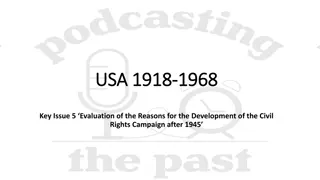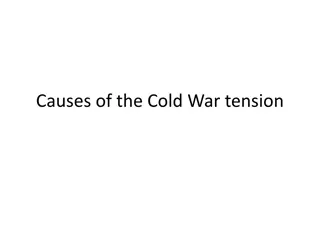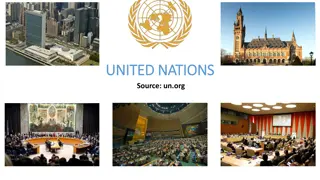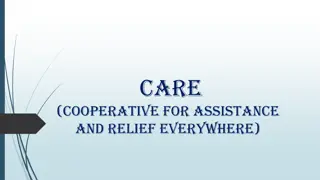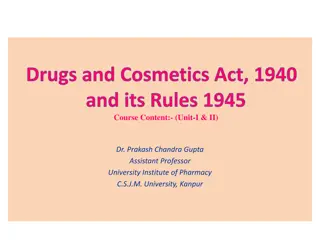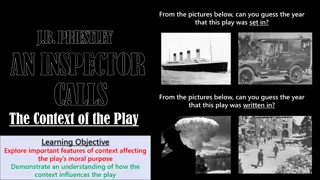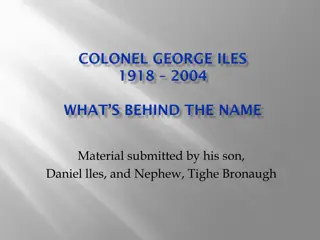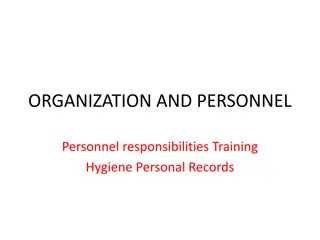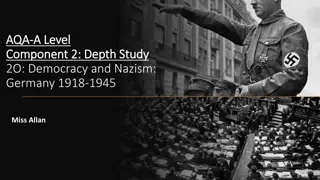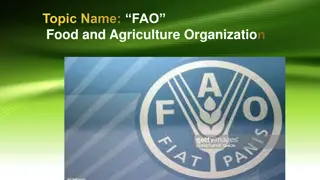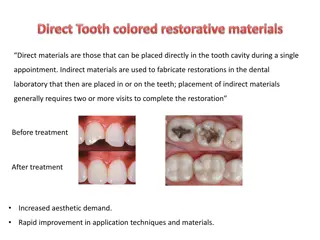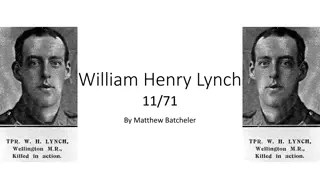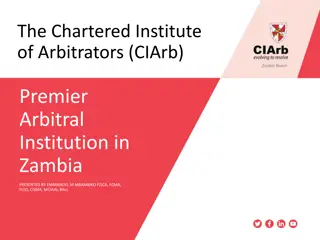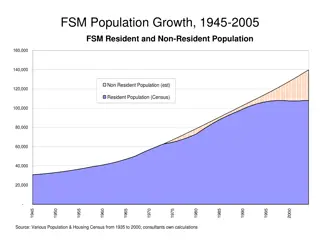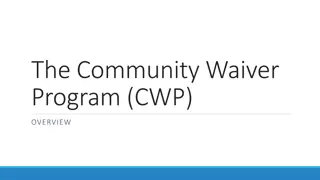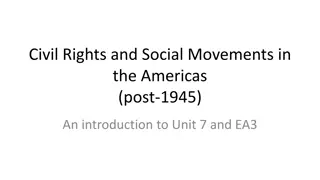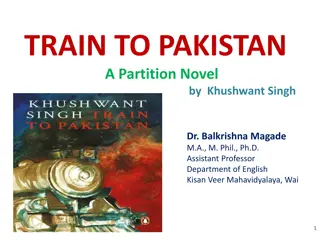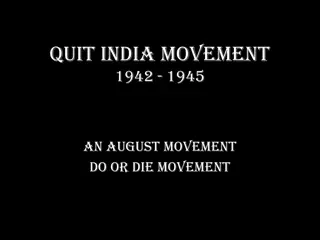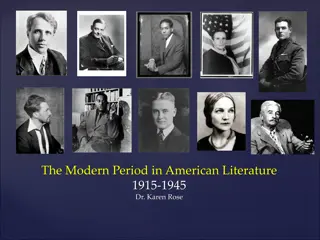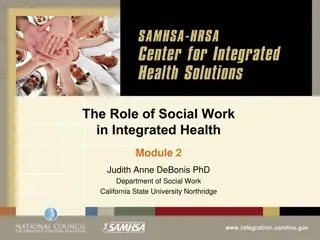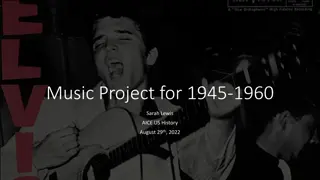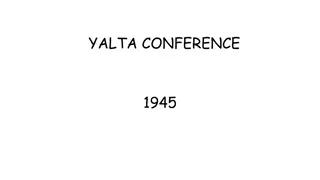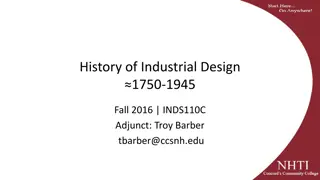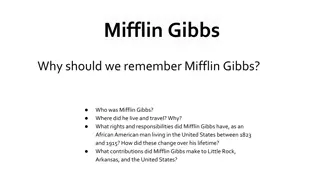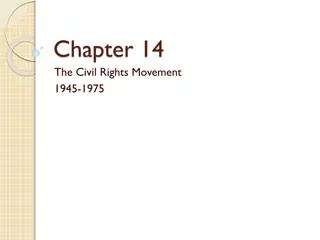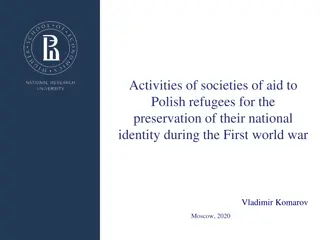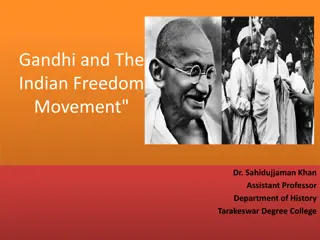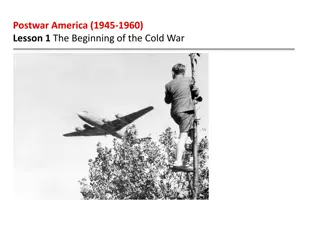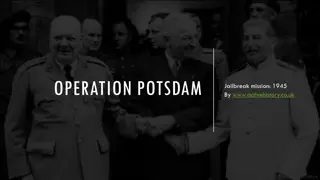World War 2 Key Events and Operations
World War 2, spanning from 1939 to 1945, saw significant events like the invasion of Poland, Operation Barbarossa, D-Day landings, and the conclusion with V-E and V-J Days. Operations such as Dieppe (Operation Jubilee) in 1942 taught crucial lessons in military strategy and coordination. The Atlanti
2 views • 38 slides
Factors Influencing the Civil Rights Campaign in the USA After 1945
The civil rights campaign in the USA after 1945 was influenced by factors such as the continuation of prejudice and discrimination, the experiences of Black servicemen in WW2, the role of Black civil rights organizations, the leadership of Martin Luther King, and the emergence of effective Black lea
0 views • 39 slides
Understanding Cold War Tensions: Causes, Events, and Decisions
Explore the complex dynamics of the Cold War era through a series of questions and analyses. Uncover the factors behind the hostile relations between the USA and the Soviet Union from 1945 to 1949, including the Berlin Blockade and key conferences like Yalta and Potsdam. Delve into the breakdown of
0 views • 33 slides
Overview of the United Nations: Mission, Membership, and Impact
The United Nations, established in 1945 with headquarters in New York City, is an international organization comprising 193 Member States. Guided by its founding Charter, the UN addresses various global challenges such as peace, climate change, human rights, and more. Through its bodies and committe
0 views • 21 slides
CARE International: Empowering Communities Worldwide
CARE (Cooperative for Assistance and Relief Everywhere) is an international humanitarian agency founded in 1945, providing aid and support in 90 countries through various projects focused on poverty alleviation, emergency response, gender equality, and advocacy for policy change. Emphasizing empower
0 views • 11 slides
Overview of Drugs and Cosmetics Act, 1940 and Its Rules 1945
The Drugs and Cosmetics Act of 1940 and its Rules of 1945 were established to regulate the import, manufacture, distribution, and sale of drugs and cosmetics in India. The Act ensures that only qualified individuals are involved in these processes and aims to prevent the entry of substandard or spur
0 views • 116 slides
Contextual Evolution in J.B. Priestley's Play: An Inspector Calls
J.B. Priestley's play "An Inspector Calls" was set in 1912 but written in 1945, reflecting the significant changes in society between these years. Explore the context and events that influenced Priestley's work, showcasing his socialist views and the impact of historical events like WWI and WWII on
0 views • 12 slides
Colonel George Iles: Patriot, Hero, Trail Blazer for African-Americans
Colonel George Iles, the first African-American pilot to obtain a pilot's license from Quincy, IL, was a trailblazer and hero during WWII. He participated in 23 missions over Germany, was shot down in 1945, and spent 3 months as a POW. His contribution, along with the 332 Pilots, paved the way for a
0 views • 11 slides
Guidelines for Personnel Training and Hygiene in Pharmaceutical Manufacturing
Personnel responsibilities in a manufacturing unit include training, hygiene, and maintaining personal records. Guidelines as per Sch.M of D&C act 1945 outline the supervision, qualifications, and duties required for technical staff, QC lab, and QA personnel. Health, clothing, and sanitation protoco
2 views • 16 slides
Understanding Democracy and Nazism in Germany (1918-1945) - A Level History Depth Study
Delve into the complex history of Germany from 1918 to 1945, focusing on the transition from democracy to Nazism. Explore key events like the rise of the Nazi Party, Hitler's dictatorship, and the impact of World War Two. Challenge preconceived notions of good and evil while enhancing your analytica
1 views • 12 slides
Overview of FAO - Food and Agriculture Organization
The Food and Agriculture Organization (FAO) is the oldest specialized agency of the United Nations, established in 1945 to combat hunger, improve nutrition, and enhance living standards through increased agricultural productivity. FAO plays vital roles in collecting and disseminating information, pr
0 views • 12 slides
Evolution of Dental Restorative Materials: From Silicate Cement to Composite Resins
Various dental restorative materials have evolved over the years, from silicate cement to composite resins. Silicate cement, introduced in 1871, offered advantages like matching tooth color but had drawbacks such as dental pulp irritation. Unfilled acrylic polymers, developed around 1945, showed imp
2 views • 11 slides
Overview of Drugs & Cosmetics Act 1940 and Rules 1945 Concerning Blood Control
The Drugs & Cosmetics Act 1940 and Rules 1945 play a crucial role in regulating the import, manufacture, distribution, and sale of drugs and cosmetics, including human blood products. Blood banks are required to adhere to licensing requirements under this act and abide by specified standards. The ru
4 views • 30 slides
The Remarkable Story of William Henry Lynch: Gallipoli Hero
Born in Wellington in 1895, William Henry Lynch enlisted in the army in 1914, embarking on a journey from New Zealand to Gallipoli, where he tragically lost his life in the Battle of Chunuk Bair in 1915. Despite dental issues, Lynch fought with valor as part of the Wellington Mounted Rifles, represe
0 views • 10 slides
The Chartered Institute of Arbitrators (CIArb) in Zambia: Premier Arbitral Institution
The Chartered Institute of Arbitrators (CIArb) is a global center of excellence for alternative dispute resolution (ADR) practices. Established in 1915 and incorporated in 1925 in the UK, it aims to elevate the status of arbitration. The Zambia branch, established in 2011, offers various services in
0 views • 18 slides
Economic and Demographic Trends in Federated States of Micronesia (1945-2004)
Population growth, employment trends, educational attainment, fishing enterprise profits, tourism statistics, subsistence economy share, and agricultural exports in Federated States of Micronesia between 1945 to 2004. The data covers resident and non-resident populations, employment in FSM and abroa
0 views • 9 slides
Origins of the Cold War: Yalta and Potsdam Conferences 1945
The Cold War's origins stem from the tensions and suspicions between the USSR and the West post-World War II, highlighted through conferences like Yalta and Potsdam. At the Yalta Conference, held in February 1945, crucial decisions were made regarding Germany, Poland, and the UN. The Potsdam Confere
0 views • 10 slides
Overview of the Community Waiver Program (CWP) and Enrollment Groups
The Community Waiver Program (CWP) aims to support full participation in communities, preserve natural living arrangements, and reduce waiting lists by offering targeted services to different enrollment groups. The program includes three authorities: 1915(c) Waiver, 1915(i) State Plan Amendment, and
0 views • 58 slides
Contractual Liability of State in India - Recognition and Application
The liability of the Indian government for breach of contract has been acknowledged since before the inception of the Constitution. Various Acts, such as the Government of India Acts of 1833, 1858, 1915, and 1935, have recognized this liability. Article 299(1) lays down specific formalities for gove
0 views • 10 slides
Civil Rights and Social Movements in the Americas Post-1945: An Overview
Explore the history, challenges, and achievements of civil rights and social movements in the Americas post-1945. Learn about the struggles faced by African Americans, Indigenous peoples, feminist movements, Hispanic Americans, and youth culture protests. Discover pivotal moments such as the Montgom
0 views • 16 slides
Top Maritime Violations FY 2017-2020: Shipyard Employment, Marine Terminals
The top violations in maritime industries from FY 2017-2020, focusing on Shipyard Employment (29 CFR 1915) and Marine Terminals (29 CFR 1917). Key areas include confined spaces precautions, guarding deck openings, PPE requirements, toxic substances control, scaffold safety, and more.
0 views • 10 slides
Khushwant Singh: Life and Works - Train to Pakistan Novel Summary
Khushwant Singh, a renowned writer and columnist, was born in 1915 in Haladi (now in Pakistan) and educated in Delhi and Lahore. He authored several books, including "Train to Pakistan," a novel on the partition. The novel, published in 1956, depicts the impact of the partition on Mano Majra, a fict
0 views • 33 slides
Order of the Arrow - Scouting's National Honor Society
Founded in 1915, the Order of the Arrow is recognized as the Boy Scouts of America's national brotherhood of honor campers. Its mission is to promote positive youth leadership and uphold values of service, outdoor adventure, and environmental stewardship. This prestigious organization aims to develo
2 views • 20 slides
Supporting Veterans in Long-Term Care Program Overview
The program outlines the historical context, long-term care settings, and the support provided to veterans in community and contract beds. It details the Department's role, program eligibility, accommodation, meals, challenges, and decision-making processes. Historical support traces back to 1915, w
0 views • 17 slides
The Quit India Movement 1942-1945: An August Movement
The Quit India Movement, also known as the August Movement or Do or Die Movement, was a mass protest on nonviolent lines in India from 1942 to 1945. Initiated by the Indian National Congress, it called for an immediate end to British rule in India. Led by leaders like Mahatma Gandhi, the movement ai
0 views • 16 slides
Evaluation of Labour Reforms 1945-51 and Their Impact on Poverty Alleviation
Following their landslide victory in 1945, the Labour Government under Clement Attlee implemented a series of reforms aimed at addressing poverty in post-WWII Britain. The Beveridge Report highlighted the giants of poverty - Want, Disease, Idleness, Squalor, and Ignorance - serving as the blueprint
0 views • 29 slides
The Life and Works of Exishe Charenc Mkrtchyan Hayk
Exishe Charenc Mkrtchyan Hayk, known as Charents, was a prominent Armenian poet who witnessed the devastation of the Armenian population by the Turkish garrison in 1915. Despite the horrors he witnessed, Charents became a fervent supporter of the Bolsheviks. He fought in the Russian Civil War, took
0 views • 6 slides
The Modern Period in American Literature: 1915-1945 - Cultural Shifts and Historical Events
America's cultural coming of age during the Modern Period (1915-1945) saw significant artistic innovations in response to historical and economic events. The era was marked by World War I, social tensions, the women's suffrage movement, Prohibition, the rise of the Ku Klux Klan, and the Great Depres
0 views • 21 slides
The Evolving Role of Social Work in Healthcare: Past, Present, and Future
The role of social work in integrated health is vital for navigating the changing landscape of healthcare. From historical perspectives dating back to 1915 to the current challenges and opportunities, this module explores the diverse functions, benefits, and significant shifts in healthcare. Student
0 views • 66 slides
Musical Highlights of 1945-1960: A Journey Through Time
Encompassing the period of 1945 to 1960, this music project delves into the cultural significance and diverse genres of music during this era. From the soul-stirring gospel of "County Folk - There's a Higher Power" by the Louvin Brothers to the electrifying rock vibes of Elvis Presley's "Jailhouse R
0 views • 11 slides
Cold War Events Timeline - Key Moments from 1945 to 1968
Explore significant events of the Cold War era, from the Yalta Conference in 1945 to the Prague Spring in 1968. The timeline includes pivotal conferences, doctrines, conflicts, and speeches that shaped the geopolitical landscape of the time.
0 views • 26 slides
Exploring the Evolution of Industrial Design: 1750-1945
Delve into the intriguing history of Industrial Design from 1750 to 1945, examining the collaboration between art and industry, mass production, changing consumption patterns, material advancements, and societal impacts. Discover the origins of Industrial Design, major design styles, and influential
0 views • 10 slides
Mifflin Gibbs: Trailblazer of Little Rock
Mifflin Gibbs, the first colored judge in the United States, lived an impactful life between 1823 and 1915. He made significant contributions to Arkansas and the U.S., overcoming challenges as an African American man. Gibbs's journey, achievements, and the evolving rights and responsibilities he fac
0 views • 13 slides
Kentucky Medicaid: Ambulance Services Coverage Overview
Kentucky Medicaid provides coverage for ambulance services including ground or air transportation at different levels of care, documentation requirements, and conditions for non-emergency transportation within and outside the medical service area. The program also outlines provisions for non-emergen
0 views • 16 slides
The Civil Rights Movement 1945-1975: Struggle for Equality and Justice
Explore the pivotal events and key figures of the Civil Rights Movement from 1945 to 1975, including the landmark Brown v. Board of Education case, the Montgomery Bus Boycott led by Rosa Parks and Martin Luther King Jr., and the fight against segregation and discrimination that reshaped American soc
0 views • 21 slides
Activities of Societies of Aid to Polish Refugees During WWI
The activities of societies aiding Polish refugees during World War I focused on preserving their national identity. These societies provided financial, material, fuel, housing, and cultural support to the refugees. The funding for these societies transitioned from private donations to government fu
0 views • 11 slides
Order of the Arrow Unit Election: Scouting's National Honor Society Overview
Order of the Arrow is a prestigious scouting organization founded in 1915 to recognize youth who exemplify the Scout Oath and Law. Members serve the BSA and community through leadership, service, and fellowship. With opportunities for high adventure and national events, the society offers a platform
0 views • 16 slides
Mahatma Gandhi and the Indian Freedom Movement
Mohandas Karamchand Gandhi, also known as Mahatma Gandhi, played a pivotal role in India's freedom movement with his philosophy of nonviolence and civil disobedience. Born in 1869 in Porbandar, Gujarat, Gandhi's experiences in South Africa and return to India in 1915 shaped his activism. He led move
0 views • 11 slides
The Beginning of the Cold War: Postwar America (1945-1960) Lesson 1
Postwar America (1945-1960) Lesson 1 explores the unraveling of the wartime alliance between the United States and the Soviet Union, President Truman's response to Soviet aggression in Eastern Europe, and the causes and results of Stalin's blockade of Berlin. The background of the Cold War, Soviet a
0 views • 22 slides
Operation Potsdam Jailbreak Mission 1945
In July 1945, amidst the aftermath of World War II, you find yourself trapped in a room bugged by the Soviets during the Potsdam Conference. Your mission is to locate hidden missions, complete tasks, decode a timeline of events, unlock padlocks, and answer security questions to escape and ensure the
0 views • 5 slides

